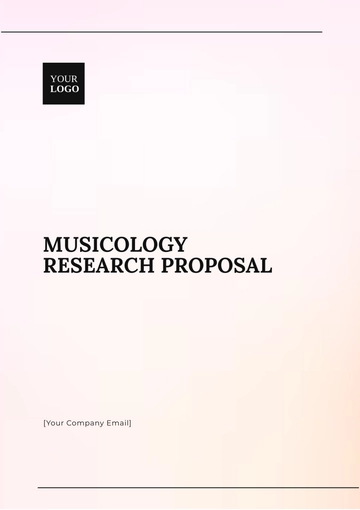Free MBA Research Proposal

Abstract
[Your Company Name]'s research proposal explores the impact of digital marketing strategies on consumer behavior within the retail industry. The primary objective is to identify how various digital marketing techniques, such as social media advertising, email campaigns, and search engine optimization, influence consumer purchasing decisions and brand loyalty. Utilizing a mixed-methods approach, the study will involve surveys and interviews with consumers and marketing professionals to gather both quantitative and qualitative data, allowing for a comprehensive analysis of the digital marketing landscape.
I. Introduction
A. Background of the Study
In recent years, the retail industry has undergone a significant transformation due to the rise of digital marketing, driven by technological advancements and changing consumer preferences. With consumers increasingly turning to online platforms for shopping, understanding the relationship between digital marketing and consumer behavior has become paramount for retail success. As a result, businesses must adapt their marketing strategies to engage effectively with consumers in a digital-first environment.
B. Problem Statement
Despite the widespread adoption of digital marketing, there is a lack of comprehensive understanding regarding its direct impact on consumer purchasing decisions. Retailers face challenges in distinguishing which digital marketing techniques yield the highest return on investment and effectively engage consumers. This gap creates a pressing need for research that explores the nuances of consumer responses to digital marketing initiatives in the retail sector.
C. Research Objectives
Primary Objective
This study aims to thoroughly examine and understand the impact of digital marketing strategies and techniques on the purchasing behavior of consumers within the retail sector. The analysis will encompass both the online and offline purchasing environments to provide a comprehensive view of how digital marketing affects consumer decisions in various shopping contexts.
Secondary Objectives
The objective is to thoroughly examine and recognize particular digital marketing methods and approaches that demonstrate the highest level of effectiveness in fostering consumer engagement and enhancing sales performance.
In order to evaluate how consumers perceive digital marketing initiatives, it is important to take into account various factors, including the level of trust they have in these initiatives, the relevance of the marketing content to their interests and needs, and the degree of personalization used in the marketing strategies.
D. Research Questions
What is the impact of digital marketing on consumer purchasing behavior in the retail industry across different demographics?
Which digital marketing strategies are perceived as most effective by consumers, and how do these perceptions vary among different age groups?
How do demographic factors, such as age, gender, and income, influence consumer responses to digital marketing campaigns?
II. Literature Review
A. Overview of Existing Research
Previous studies have highlighted the growing importance of digital marketing in shaping consumer behavior, indicating that targeted online advertising can significantly increase consumer engagement and conversion rates. Research has also shown that social media platforms play a crucial role in influencing consumer decisions by fostering interaction and brand loyalty. However, there remains a need for a comprehensive examination of how various digital marketing strategies impact consumer behavior specifically in the retail sector.
B. Identification of Gaps in the Literature
While existing literature acknowledges the role of digital marketing, there is limited research on its specific effects on consumer decision-making processes in the retail sector. Additionally, most studies focus on either qualitative or quantitative approaches, leaving a gap in integrated studies that combine both perspectives. This research aims to fill these gaps by providing a holistic view of consumer responses to diverse digital marketing tactics in a retail context.
C. Theoretical Framework
Relevant Theories
This research will utilize the Theory of Planned Behavior, which suggests that attitudes, subjective norms, and perceived behavioral control influence consumer intentions. This theory provides a robust framework for understanding how consumers make decisions based on digital marketing messages.
Application to Proposed Research
The study will undertake an examination of the ways in which digital marketing strategies are aligned with various components to influence consumer behavior. It will pay special attention to the impact that the perceived trustworthiness and relevance of marketing communications have on shaping consumer actions and decisions.
III. Methodology
A. Research Design
This study will employ a mixed-methods approach, combining qualitative and quantitative research methods to gather comprehensive data. By integrating surveys and interviews, the research will provide a more nuanced understanding of consumer behavior in response to digital marketing. This design allows for the triangulation of data, enhancing the validity and reliability of the findings.
B. Data Collection Methods
Primary Data
Surveys will be distributed to a diverse sample of retail consumers to quantify the impact of digital marketing strategies, focusing on their purchasing behavior and attitudes. Additionally, in-depth interviews with marketing professionals will provide qualitative insights into effective marketing practices and the rationale behind strategy choices.
Secondary Data
Existing literature and industry reports will be reviewed to contextualize findings, providing a broader understanding of digital marketing trends and consumer behavior in the retail industry.
C. Sample Selection
Target Population
Consumers aged 18-65 who shop online at retail websites will be the primary target population for this study, reflecting the growing trend of online shopping.
Sampling Technique
A stratified random sampling method will be used to ensure representation across different demographics, including age, gender, and income levels. This approach aims to capture a diverse range of perspectives on digital marketing effectiveness.
D. Data Analysis Techniques
Statistical Tools
Descriptive and inferential statistics will be applied to survey data using software like SPSS, enabling the analysis of relationships between digital marketing strategies and consumer behavior.
Qualitative Analysis
Thematic analysis will be utilized for interview transcripts to identify recurring themes and insights, providing a deeper understanding of the factors influencing consumer perceptions and decisions.
IV. Timeline
A detailed timeline will outline the phases of the research, including literature review, data collection, analysis, and report writing. The expected duration for each phase is as follows:
This timeline provides a clear overview of the research process, ensuring that each phase is adequately planned and executed. Adhering to this schedule will facilitate timely completion of the project.
V. Budget
The estimated budget for the research is as follows:
Expense Item | Description | Estimated Cost ($) |
|---|---|---|
Survey Distribution | Costs associated with online survey platforms. | $200 |
Interview Incentives | Compensation for participants in interviews. | |
Software Licenses | SPSS software license for data analysis. | |
Printing Costs | Printing of survey materials and consent forms. | |
Miscellaneous Expenses | Unexpected costs or additional resources. | |
Total Estimated Cost | $200 |
Explanation of Budget Items:
Survey Distribution: This includes costs for using online platforms such as SurveyMonkey or Qualtrics to distribute the surveys effectively.
Interview Incentives: To encourage participation in interviews, participants will receive a small monetary incentive, making it more likely that they will engage and provide valuable insights.
Software Licenses: SPSS is essential for statistical analysis of survey data, providing the tools necessary to draw meaningful conclusions from the research.
Printing Costs: Necessary for producing hard copies of surveys and consent forms, ensuring all participants have clear documentation.
Miscellaneous Expenses: This buffer will cover any unforeseen costs that may arise during the research process, ensuring that the project remains on budget.
By carefully outlining the timeline and budget, this proposal demonstrates a commitment to thorough planning and resource management, essential for the successful completion of the research project.
VI. Expected Outcomes
A. Anticipated Contributions to the Field
This research aims to provide significant insights into the impact of digital marketing strategies on consumer behavior in the retail industry. By identifying effective marketing practices, the findings will contribute to the academic literature on digital marketing and consumer psychology. The study's results could also inform retail managers about how to optimize their marketing efforts, leading to improved customer engagement and increased sales. Ultimately, this research will serve as a valuable resource for both academics and practitioners in understanding the evolving dynamics of consumer behavior in the digital age.
B. Potential Practical Applications
The practical applications of this research are manifold, particularly for retailers seeking to enhance their digital marketing strategies. By understanding which strategies resonate most with consumers, businesses can tailor their marketing efforts to maximize impact and efficiency. The research findings will enable retailers to make data-driven decisions, optimizing budget allocations for marketing initiatives and improving overall return on investment. Furthermore, the study's insights into consumer preferences can aid in the development of personalized marketing campaigns that foster brand loyalty and long-term customer relationships.
C. Implications for Future Research
This research will pave the way for future studies by identifying key areas that warrant further exploration. As the digital marketing landscape continues to evolve, there is a need for ongoing research to assess the effectiveness of emerging marketing channels and techniques, such as influencer marketing and artificial intelligence in consumer targeting. The findings of this study may also highlight the importance of cross-cultural differences in consumer responses to digital marketing, encouraging researchers to investigate these dynamics in diverse markets. By laying a solid foundation for subsequent research, this study will contribute to a deeper understanding of consumer behavior in a rapidly changing digital environment.
- 100% Customizable, free editor
- Access 1 Million+ Templates, photo’s & graphics
- Download or share as a template
- Click and replace photos, graphics, text, backgrounds
- Resize, crop, AI write & more
- Access advanced editor
Elevate your research game with the MBA Research Proposal Template from Template.net. This fully editable and customizable template empowers you to craft a compelling proposal effortlessly. With our intuitive AI Editor Tool, you can easily tailor every section to fit your unique project needs, ensuring a professional presentation that stands out to reviewers.
You may also like
- Business Proposal
- Research Proposal
- Proposal Request
- Project Proposal
- Grant Proposal
- Photography Proposal
- Job Proposal
- Budget Proposal
- Marketing Proposal
- Branding Proposal
- Advertising Proposal
- Sales Proposal
- Startup Proposal
- Event Proposal
- Creative Proposal
- Restaurant Proposal
- Blank Proposal
- One Page Proposal
- Proposal Report
- IT Proposal
- Non Profit Proposal
- Training Proposal
- Construction Proposal
- School Proposal
- Cleaning Proposal
- Contract Proposal
- HR Proposal
- Travel Agency Proposal
- Small Business Proposal
- Investment Proposal
- Bid Proposal
- Retail Business Proposal
- Sponsorship Proposal
- Academic Proposal
- Partnership Proposal
- Work Proposal
- Agency Proposal
- University Proposal
- Accounting Proposal
- Real Estate Proposal
- Hotel Proposal
- Product Proposal
- Advertising Agency Proposal
- Development Proposal
- Loan Proposal
- Website Proposal
- Nursing Home Proposal
- Financial Proposal
- Salon Proposal
- Freelancer Proposal
- Funding Proposal
- Work from Home Proposal
- Company Proposal
- Consulting Proposal
- Educational Proposal
- Construction Bid Proposal
- Interior Design Proposal
- New Product Proposal
- Sports Proposal
- Corporate Proposal
- Food Proposal
- Property Proposal
- Maintenance Proposal
- Purchase Proposal
- Rental Proposal
- Recruitment Proposal
- Social Media Proposal
- Travel Proposal
- Trip Proposal
- Software Proposal
- Conference Proposal
- Graphic Design Proposal
- Law Firm Proposal
- Medical Proposal
- Music Proposal
- Pricing Proposal
- SEO Proposal
- Strategy Proposal
- Technical Proposal
- Coaching Proposal
- Ecommerce Proposal
- Fundraising Proposal
- Landscaping Proposal
- Charity Proposal
- Contractor Proposal
- Exhibition Proposal
- Art Proposal
- Mobile Proposal
- Equipment Proposal
- Student Proposal
- Engineering Proposal
- Business Proposal





























